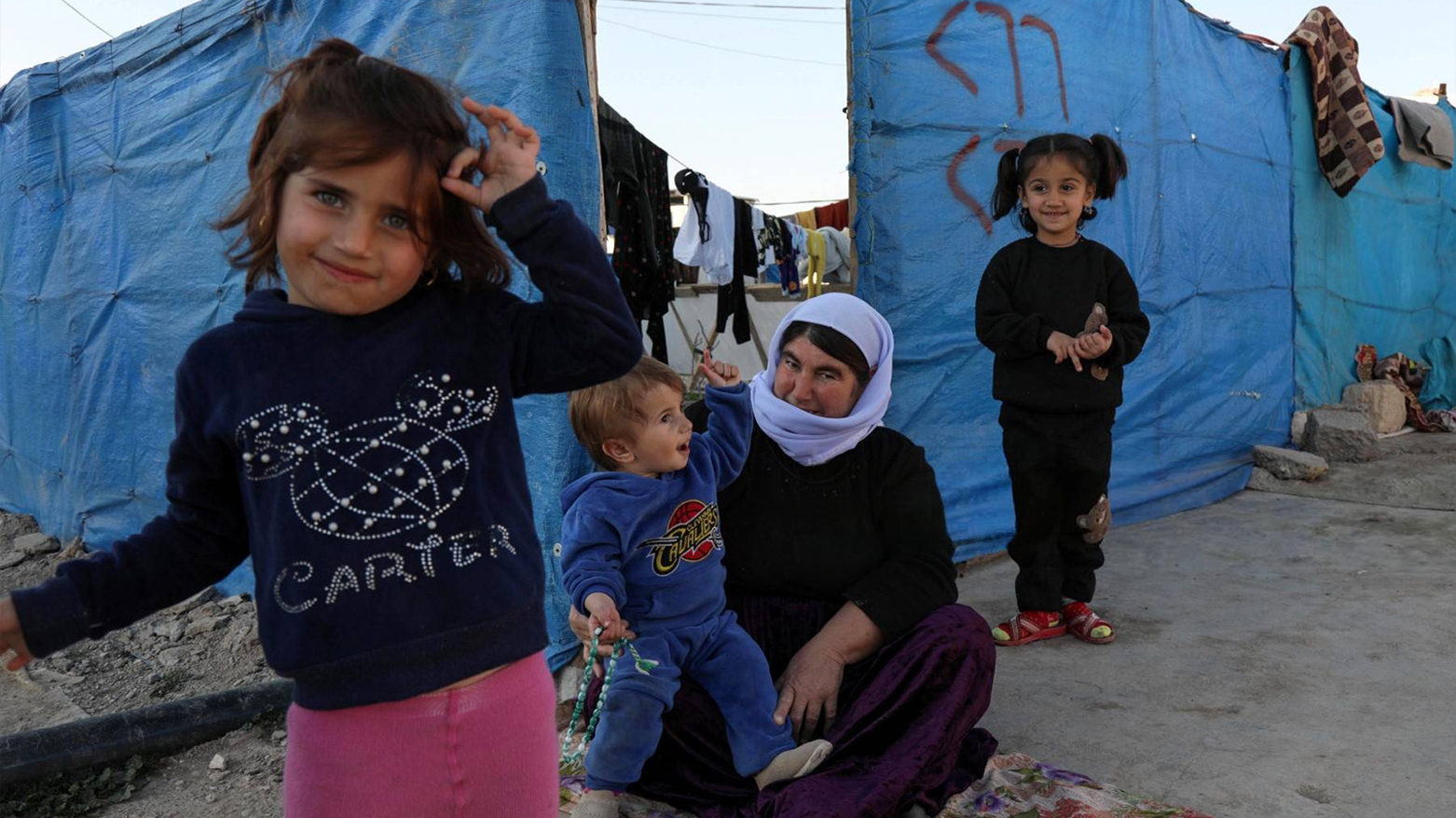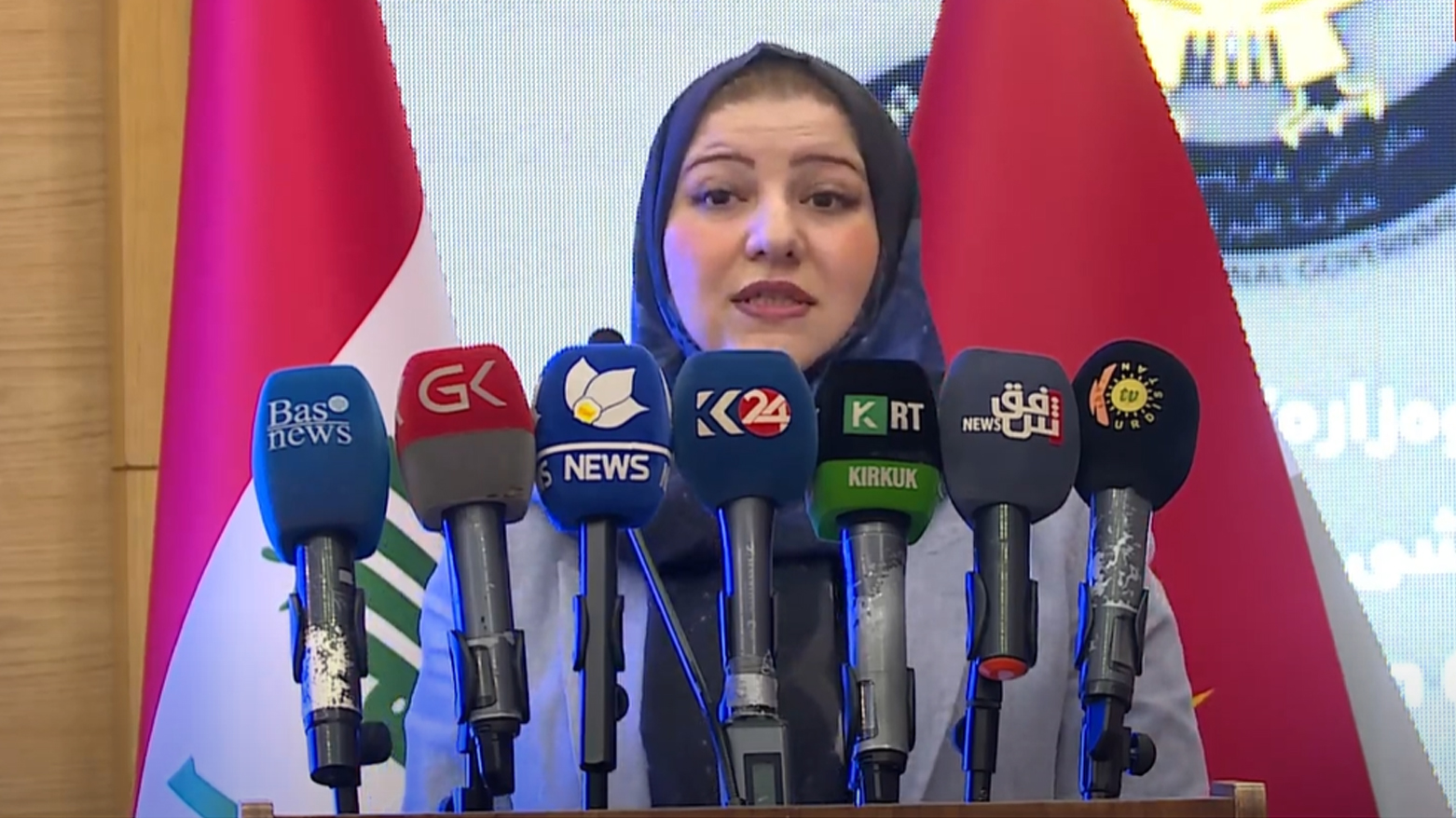Kurdistan Region Hailed as Middle East Model for Migration Governance
The Kurdistan Region has been officially recognized by the IOM as a progressive model for migration governance in the Middle East, lauded for its comprehensive policies and humanitarian services amid a protracted and large-scale displacement crisis.

ERBIL (Kurdistan24) — The Kurdistan Regional Government (KRG) has been officially recognized as a progressive model for migration governance and humanitarian excellence across Iraq and the Middle East, a landmark acknowledgment of its decade-long effort in managing one of the world’s most complex displacement crises.
The announcement, made Monday by Srwa Rasul, the Director of the Joint Crisis Coordination Centre (JCC) at the KRG’s Ministry of Interior, is based on a comprehensive assessment by the International Organization for Migration (IOM), reaffirming the region’s commitment to providing essential services and upholding the rights of hundreds of thousands of refugees and internally displaced persons (IDPs).
In a press conference held in Erbil, Rasul detailed that the recognition was the outcome of the IOM’s "Migration Governance Indicators (MGI)" assessment, an innovative and globally utilized tool designed to help governments evaluate their migration policies against approximately 100 specific indicators.
"The results of this assessment reaffirm the essential services and rights that the Kurdistan Regional Government has provided to displaced persons and refugees in all areas," Rasul stated, adding that the region's policies were benchmarked against seven key principles of the MGI framework. The rigorous assessment process, which began last year in partnership with the Ministry of Interior, involved the participation of numerous international organizations, government institutions, and relevant ministries, reflecting a collaborative and transparent approach to evaluating the KRG’s performance.
Rasul also highlighted the JCC's pivotal role in coordinating the multifaceted response with United Nations agencies and international partners to effectively manage the affairs of the displaced population.

This formal recognition comes as the Kurdistan Region continues to navigate the immense and protracted challenges of hosting a vast population of vulnerable individuals.
According to the United Nations High Commissioner for Refugees (UNHCR) in its January 2025 Iraq Update, the country generously hosts over 339,000 refugees and asylum-seekers, a staggering 90% of whom are Syrian and reside within the Kurdistan Region. The data underscores the sheer scale of the situation, with over 70% of refugees living in urban areas and the remaining 30% in nine dedicated refugee camps.
Compounding this is the presence of over one million IDPs across Iraq, with 108,000 living in 20 IDP camps within the Kurdistan Region.
The demographic breakdown reveals a profound vulnerability, as 40% of all refugees are children under the age of 18. This sustained humanitarian burden is shouldered amidst significant financial constraints; the UNHCR report starkly noted that only 11% of the required $158.5 million for its 2025 operations in Iraq has been funded, placing immense pressure on both international agencies and the host government.
Despite these fiscal pressures, the KRG, in coordination with its partners, has maintained a robust and proactive humanitarian response.
The UNHCR’s January achievements alone paint a picture of relentless effort: over 14,000 refugees were newly registered and verified, a process crucial for accessing government-issued documentation and protection against refoulement.
Furthermore, 10,236 vulnerable refugee families received cash assistance for basic needs like rent and food, 619 students were provided with non-formal education programs, and 132 individuals were released from detention thanks to legal support from UNHCR and its partners. Tangible infrastructure projects also came to fruition, including the opening of a new Primary Health Centre in Qushtapa in collaboration with the WHO, which will serve an estimated 10,000 refugees, IDPs, and host community members.
In Duhok governorate, a new 18-classroom school was opened in the Sumel district, set to benefit approximately 13,000 local and displaced children under the Refugee Education Integration Policy (REIP), while a new multi-functional community center was inaugurated in Zakho to provide support services for all communities.
The KRG’s approach has been underpinned by a clear strategic and legal framework aimed at aligning its policies with international human rights standards.
Dindar Zebari, the Kurdistan Region’s Coordinator for International Advocacy, highlighted this commitment during an August 2024 conference, referencing the ‘Regional Human Rights Action Plan for 2021-2025’. Zebari noted that the KRG has implemented numerous international recommendations concerning the reception, accommodation, and provision of essential services for displaced populations.
In a significant step towards long-term solutions, he revealed that the KRG, in collaboration with the IOM, has developed a draft law for a ‘National Strategy for Migration in Iraq and the Kurdistan Region.’ This policy-driven approach is further evidenced by the KRG’s substantial investment in education, with 138 schools specifically allocated for refugees and an additional 54 mainstream schools integrating them, providing formal education to over 40,000 refugee students.
However, the reality on the ground remains deeply challenging for the displaced individuals themselves.
A February 2025 UN report detailed that over 511,000 IDPs and refugees reside in Erbil and Duhok provinces, with the vast majority living outside formal camps. This trend signifies a shift toward integration but also presents new challenges related to housing, employment, and access to services in urban settings.
Life within the camps, as articulated by residents, is fraught with hardship. "Life in the camps is challenging, with acute shortages of food and inadequate health services," one displaced person stated. Another voiced a common desire, hindered by immense obstacles: "Our desire is to return home, but the absence of shelter, employment, and financial support hinders this."
The failure to implement critical political agreements, such as the Sinjar agreement, remains a significant barrier to the safe and dignified return of many IDPs, particularly the Yazidi community, who constitute a large portion of the displaced population in Duhok.
Recognizing these barriers, the KRG has consistently maintained that the closure of camps cannot be rushed and must be contingent upon the establishment of security, compensation, and transitional justice in areas of origin.
This principled stance has been a cornerstone of its policy, even as it shoulders an immense financial load. According to JCC data, the KRG is responsible for 80% of the services provided to refugees, dedicating approximately $2.3 daily per individual, which amounts to a staggering annual expenditure of around $842 million to support nearly one million displaced people.
This commitment has continued despite a pause in international aid directed to Iraq, a decision based on the country's oil wealth that often overlooks the specific and immense pressures faced by the Kurdistan Region.
The IOM’s recognition, therefore, is not merely a symbolic honor but a validation of a sustained, principled, and costly commitment that has provided sanctuary and stability in a region beset by turmoil, setting a standard for humanitarian governance that others may now look to emulate.
